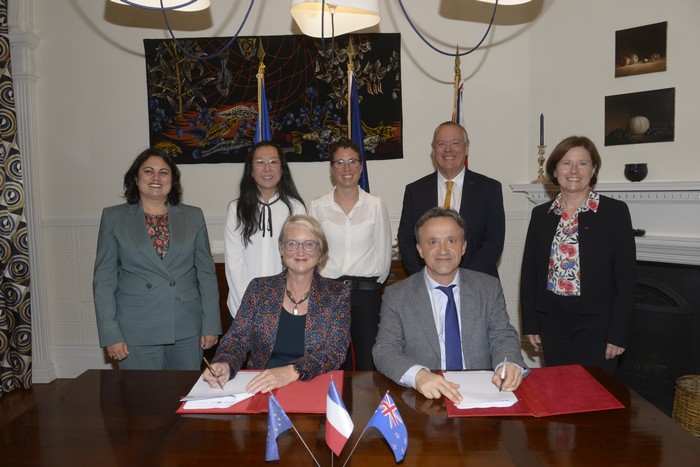Scion and INRAE boost scientific cooperation to extend biobased research
For immediate release
6 April 2023
An agreement signed between Scion and one of France’s key research organisations creates fresh opportunities to extend Scion’s research exploring biobased products and to support New Zealand’s transition to a circular bioeconomy.
With the global climate crisis front of mind for many in the wake of Cyclone Gabrielle and more frequent adverse weather events, the agreement will enhance cooperation on research and innovation to accelerate biorefineries and biomaterials research – work that is developing alternative products to those made from fossil fuels.
Speaking after the signing ceremony at the French Embassy in Wellington, Scion chief executive Dr Julian Elder says the agreement strengthens joint research between Scion and the French National Research Institute for Agriculture, Food and the Environment (INRAE), and is a welcome boost to scientific cooperation between France and New Zealand.
“As a Crown Research Institute, we’ve had the pleasure of collaborating with INRAE for more than 20 years across many research areas,” he says.
“In the last decade, we’ve particularly benefited from our work with INRAE’s Transform division and research that has helped to characterise plant materials before their transformation into biobased products and materials used for 3D and 4D printing.
“Our intention with the new agreement is to build on this work and create an Associated International Laboratory that will contribute to further bioproducts research, with a focus on advancing our knowledge and capabilities with biorefineries and plant materials that can be used to design fossil-free materials for the future.”
Scion’s biorefinery research is exploring new ways of creating high-value products from plant-based waste products, such as pine bark. It’s part of a wider programme of research focused on the circular bioeconomy that seeks to get the most value out of renewable biological resources while minimising waste.
The agreement with INRAE to create the Associated International Laboratory also involves collaboration with the University of Montpellier in France.
Scion’s general manager for Forests to Biobased Products, Dr Florian Graichen, says the agreement is timely and follows February’s announcement that New Zealand researchers can now participate in the Horizon Europe innovation and research programme.
The arrangement makes New Zealand one of the first countries outside Europe eligible to participate in the programme - with more than €90 billion (about NZD$153 billion) of funding available over seven years.
“We believe that INRAE will become one of our key European partners working with us on unlocking New Zealand's opportunities around biorefineries, biomanufacturing and bioproducts. This will allow New Zealand to meaningfully mitigate and take actions against climate change, while being able to benefit from the global transformation of economies to circular bioeconomies.”
The signing on 30 March was one of four agreements signed at the French Embassy in the presence of
Research, Science and Innovation Minister Hon Dr Ayesha Verrall, the French Ambassador to New Zealand HE Laurence Beau, the President of INRAE Philippe Mauguin, and senior executives from Science New Zealand, AgResearch, and Scion.

The Scion team included Dr Claire Mayer-Laigle, an INRAE researcher from the Joint Research Unit in Montpellier. She visited Scion in 2018 for a one-week exchange with her counterpart Dr Marie Joo Le Guen. Marie Joo was subsequently invited to present at Claire’s laboratory. These successful interactions led to a joint conference presentation and research publication – proof of how the scientific exchanges evolve and benefit both parties over time.
In 2020, Claire was awarded a prestigious Marie Skłodowska–Curie fellowship in partnership with Scion. This supports Claire to work at Scion on a three-year research programme exploring the use of plant material in 4D printing.
Board chair Dr Helen Anderson signed the agreement on behalf of Scion and says it will facilitate more collaborative research projects and enhance career development, particularly for post-graduate students.
“Partnering internationally enables us to share the very latest thinking and technologies and will help us to address the world’s biggest challenges together.
“As we look to 2050 with a strategy targeting New Zealand’s carbon-zero goals and the transition to a circular bioeconomy, we’re excited by the opportunities that this closer cooperation with INRAE presents.”
French Ambassador HE Laurence Beau said the agreements would make it easier for researchers from both countries to work on innovative solutions that would benefit everyone.
“Working to adapt land-based sectors to climate change has become increasingly vital for our world, and particularly for New Zealand after the recent cyclone and floods.”
The agreements build on a history of scientific exchange between France and New Zealand that has been championed by the FAST (France Aotearoa Science Technology Innovation) group.
